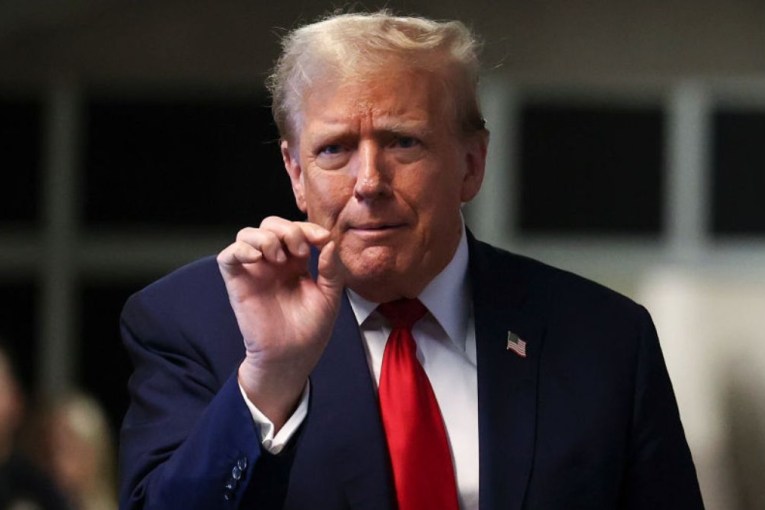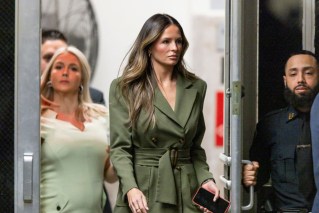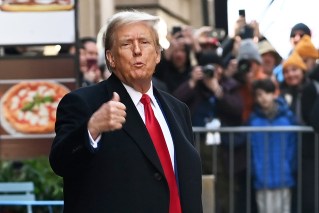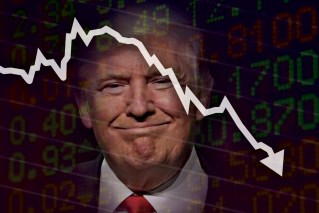Donald Trump can still be president, despite fourth set of charges

Former US President Donald Trump has been hit with his fourth set of legal charges. This time, he is accused of trying to overturn the 2020 election results in Georgia.
Despite the fresh charges on top of other charges, Mr Trump can still run for president and he might even be able to pardon himself if he becomes president.
On Tuesday, a Georgia grand jury charged Mr Trump over a scheme to overturn his election defeat.
The charges were brought by Fulton County District Attorney Fani Willis and accuse not only Mr Trump, but 18 of his associates, including Mark Meadows, and lawyers Rudy Giuliani and John Eastman.
This is the fourth time Mr Trump has been criminally indicted.
Mr Trump and the other defendants have until noon local time on Friday, August 25, to surrender voluntarily, rather than face arrest, Ms Willis said.
Ms Willis said she intends to try all 19 defendants together.
The Georgia charges
On January 2, Mr Trump allegedly called up Brad Raffensperger, Georgia’s top election official and urged him to “find” the votes to overturn his slim loss in the state.
Mr Raffensperger declined to do so and days later, Mr Trump’s supporters descended on the capital in an attempt to prevent lawmakers from certifying Joe Biden’s victory.
The indictment out of Georgia includes 41 felony counts, with all 19 defendants charged with racketeering.
For Mr Trump specifically, he was charged with violating Georgia’s Racketeer Influenced and Corrupt Organisations (RICO) Act; solicitation of violation of oath by a public officer; conspiracy to commit forgery in the first degree; conspiracy to commit impersonating a public officer, and conspiracy to commit filing false documents.
The indictment lays out a number of crimes Mr Trump and his associates allegedly committed before the election in 2020 and up until September 2022.
Such alleged crimes include falsely testifying to lawmakers that election fraud had occurred and urging state officials to alter the results.
The indictment claims the defendants tried to subvert the electoral process by submitting false slates of electors and they breached voting equipment in a rural Georgia county, including personal voter information and images of ballots.
Reaching across state lines, the indictment alleges that Mr Giuliani, Mr Meadows and others called officials in Arizona, Pennsylvania and elsewhere to urge them to change the outcome in those states.
There are 30 other co-conspirators mentioned in the indictment, though they were not named or charged.
The other defendants

Rudy Giuliani is one of the defendants charged with criminal racketeering. Photo: Getty
- Rudy Giuliani: Mr Trump’s former personal lawyer
- John Eastman: Former Trump lawyer
- Sidney Powell: Former Trump campaign attorney
- Kenneth Chesebro: Lawyer advising the Trump campaign
- Mark Meadows: Former White House chief of staff
- Jeffrey Clark: Former Department of Justice official
- Ray Smith: A Georgia-based lawyer who represented Mr Trump in a legal challenge in the state, following the election
- Michael Roman: Trump campaign aide
- David Shafer: A false elector in Georgia, former state senator and chairman of the Georgia Republican Party
- Shawn Still: Georgia state senator, signed certificate falsely stating Mr Trump won the state
- Cathy Latham: Chair of the Coffee County Republican Party, false GOP elector
- Scott Hall: Georgia bail bondsman, allegedly involved in illegally breaching election equipment
- Misty Hampton: Former Coffee Country elections director, allegedly involved in allowing Trump supporters to access election equipment
- Robert Cheeley: Georgia-based lawyer, made allegations that election workers were counting votes more than once
- Jenna Ellis: A lawyer who made false claims about election fraud
- Stephen Lee: Involved in the intimidation of an election worker
- Harrison Floyd: Involved in the intimidation of an election worker
- Trevian Kutti: Involved in the intimidation of an election worker, allegedly recruited to do so by Floyd.
Could Trump and his friends go to jail?
Racketeering, which all of the defendants have been charged with, carries a penalty of up to 20 years in prison.
The minimum prison sentence for this offence is five years.
Although the charges in the Georgia case are serious, the BBC noted that many of the charges will likely result in a fine if convicted, rather than a prison sentence.
However, there is still a chance Mr Trump could serve time.
Before Mr Trump was indicted in Georgia, Politico worked out that between the three other indictments, and if he were convicted on all counts and handed the maximum statutory penalty for each, he could face 641 years in prison.
Earlier in August, Mr Trump was charged following Jack Smith’s investigation into alleged 2020 election interference.
This is a federal case, as is the case regarding the classified national security documents.
The indictment in New York, which is about hush money allegedly given to Stormy Daniels, and the Georgia case, are state cases.

Donald Trump continues to claim there was voter fraud that cost him votes in the 2020 presidential election. Photo: Getty
If elected president, Mr Trump will not have the presidential power to shut down state cases or pardon himself, but it could be a different story for federal cases.
According to CNN, if Mr Trump were to be elected president before a federal trial concludes, his Justice Department might be able to dismiss the case entirely.
As for pardoning himself in a federal cases, it hasn’t been done before, because no sitting president has tried it, but self-pardoning could be a possibility as the Constitution doesn’t explicitly prohibit it.
“Whether he can do so is untested. The Supreme Court may have to weigh in,” law professor Richard L. Hasen told CNN.
Tweet from @RpsAgainstTrump
What does this mean for the 2024 election?
Mr Trump remains the frontrunner for the Republican nomination and can still run for president.
Facing criminal charges or even serving prison time do not bar someone from running for, or becoming, president.
Mr Trump might be urged to drop out of the race, but so far even his Republican opponents aren’t speaking ill of him.
Of course, as with the other three indictments, Mr Trump has remained defiant and insisted the “witch hunt” was continuing.
Mr Trump has denied any wrongdoing and has pleaded not guilty in three other criminal cases.
Trump’s other legal woes
As we head into the election year, Mr Trump is going to be busy both in court and on the campaign trail.
He faces a New York state trial in March 2024 involving an alleged hush money payment to a porn star, and a federal trial in May in Florida for allegedly mishandling federal classified documents.
In both cases Mr Trump pleaded not guilty.
A third indictment, in Washington federal court, accuses him of illegally seeking to overturn his 2020 election defeat.
Mr Trump denies wrongdoing in this case as well, and a trial date has yet to be set.







